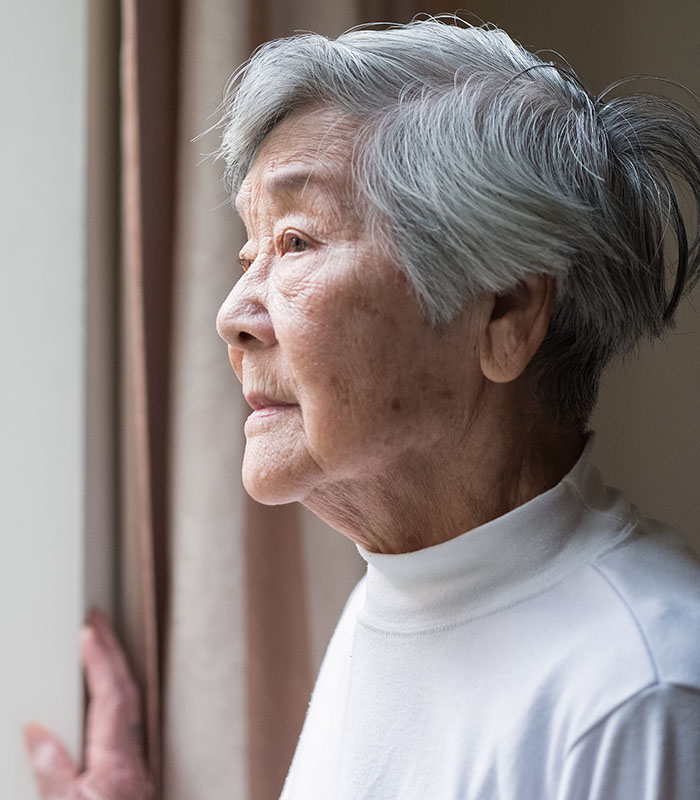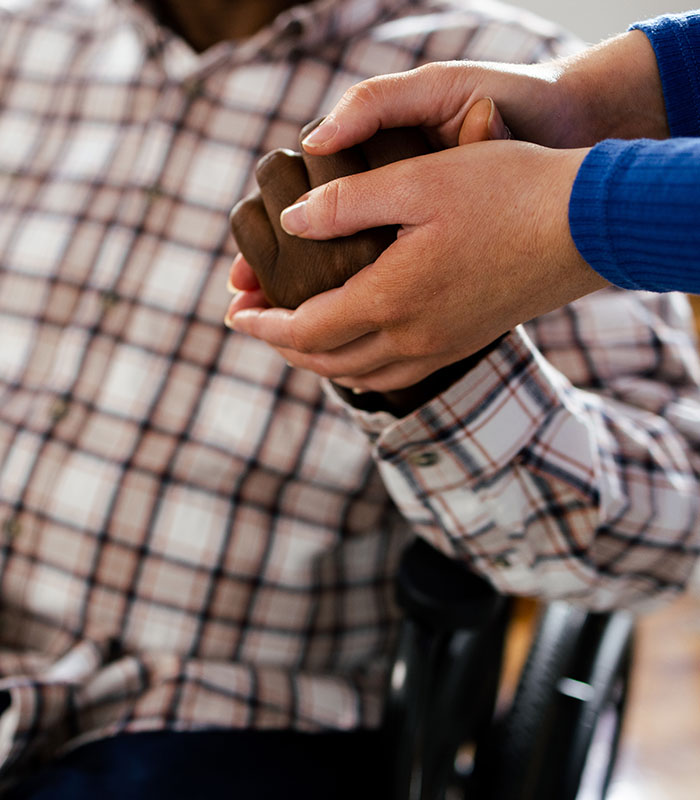Nursing Home Injury
What Is Nursing Home Neglect?
Serving Kansas, Missouri, and Arkansas
Nursing home neglect is a form of abuse in which facilities, staff members, and caregivers fail to provide for residents’ basic needs. The main difference between nursing home abuse and nursing home neglect is intent; abuse typically indicates some degree of intent, whereas neglect can occur with or without intent. In other words, negligence does not have to be intentional to constitute nursing home neglect.

Examples Include
- Failing to give residents adequate food and/or water
- Failing to seek medical attention on behalf of residents
- Failing to treat residents’ injuries, illnesses, or infections
- Leaving a resident alone for an extended period of time
- Isolating residents or keeping them from engaging in social activities
- Failing to clean residents on a daily basis
- Failing to regularly change residents’ clothing or bedding
- Failing to supervise residents and prevent them from wandering off
- Failing to provide a clean, safe environment for residents
- Preventing residents from seeing friends or family members
These and other types of nursing home neglect can have devastating consequences, including serious bodily injury, severe illness, and even death. Nursing homes, long-term care facilities, and other assisted living centers must care for residents’ basic needs. This includes not only their physical needs, but also their mental, social, and psychological needs as well. When caregivers fail to provide for these needs, leading to physical injuries or psychological harm, they can be held accountable.
Warning Signs of Nursing Home Neglect
There are several warning signs that indicate a nursing home or similar long-term care facility is failing to provide for residents’ needs. Some of the warning signs of nursing home neglect include:
- New or worsened mobility issues
- Poor personal hygiene
- New or worsened mental health conditions
- Unexplained injuries
- Unsanitary living conditions
- Soiled or dirty bedding or clothing
- Changes in mood or behavior
If you notice any warning signs of nursing home neglect, act immediately. If you believe someone is in immediate danger, call 911; otherwise, you can report suspected neglect to the appropriate authorities. You should also reach out to an experienced Kansas City, Independence, MO, Lee’s Summit, MO, and Blue Springs nursing home neglect attorney, like those at the Law Office of Tom Wagstaff Jr., who can help protect your rights and advise you on your next steps.
Common Causes of Nursing Home Neglect
Nursing home neglect is never acceptable, yet it occurs frequently in nursing homes and long-term care facilities throughout the United States. There are many reasons for this, including but not limited to:
- Personnel issues, such as understaffing or inadequate training
- Negligent hiring, including hiring untrained or inexperienced staff
- Improper nursing home/facility management
- Unsupervised care, including lack of staff supervision
- Intentional misconduct by staff
At the Law Office of Tom Wagstaff Jr., we believe that those responsible for nursing home neglect should be held accountable, regardless of the cause. Our Kansas City nursing home neglect attorneys have extensive experience representing victims and their families in these types of cases, and we are prepared to help you fight for the justice you deserve.
Common Types of Nursing Home Abuse
Nursing home abuse can take various forms, all of which are serious violations of the well-being and rights of elderly residents. Here are some common types of nursing home abuse:
This involves the intentional use of force that results in bodily harm, injury, pain, or impairment. Physical abuse can include hitting, pushing, slapping, kicking, restraining, or any other form of physical violence.
Emotional abuse involves the infliction of mental anguish, emotional pain, distress, or fear through verbal or non-verbal actions. This can include threats, intimidation, humiliation, insults, isolation, or any behavior that causes emotional harm.
Neglect occurs when caregivers fail to provide the necessary care, attention, or assistance required for the well-being of residents. This can include failure to provide food, water, medication, hygiene assistance, medical care, or adequate supervision.
Financial exploitation involves the unauthorized or improper use of an elderly person's funds, property, or assets. Caregivers or staff may steal money, forge signatures, coerce residents into signing financial documents, or exploit them through scams or fraudulent schemes.
Sexual abuse involves any unwanted sexual activity or contact perpetrated against an elderly resident. This can include rape, molestation, unwanted touching, coercion, or any form of sexual harassment.
Medication abuse occurs when caregivers administer medications improperly or use drugs to restrain or sedate residents without a legitimate medical reason. Overmedication, undermedication, or administering the wrong medication can all constitute forms of medication abuse.
Healthcare fraud involves billing for services that were not provided, providing unnecessary medical treatments or services, or misrepresenting services to obtain higher reimbursements. This can result in financial loss and may also compromise the health and safety of residents.
What Is the Most Common Abuse in Nursing Homes?
According to the World Health Organization (WHO), nursing home abuse has worsened since the start of the COVID-19 pandemic, which put resource strains on nursing homes and assisted living facilities. Recent data shows that about 16% of elders suffer abuse or neglect each year, and a staggering 66% of nursing home staff members admitted to causing abuse in a unanimous survey. Out of the many forms of abuse inflicted by those staff members, emotional abuse appears to be the most common. Even though emotional abuse does not involve physical injury or financial theft, it can still devastate a senior’s well-being and is entirely unacceptable.
Who Is Liable for Nursing Home Abuse?
Determining liability for nursing home abuse can involve multiple parties, depending on the specific circumstances of the abuse and the laws governing the jurisdiction. Here are some potential parties who might be held liable for nursing home abuse:
The nursing home facility itself may be held liable for abuse that occurs on its premises. This includes situations where the facility failed to properly screen or supervise its staff, maintain a safe environment, or implement adequate policies and procedures to prevent abuse.
Individual staff members who commit acts of abuse can be held personally liable for their actions. This includes nurses, caregivers, administrators, or any other employees who engage in abusive behavior.
If abuse occurs due to systemic issues within the nursing home, such as understaffing, inadequate training, or a culture of neglect, the management or ownership of the facility may be held liable for failing to address these issues.
In some cases, nursing homes may contract out certain services, such as medical care, therapy, or dietary services. If abuse occurs as a result of negligence or misconduct by these contracted service providers, they may also be held liable.
In situations where abuse is perpetrated by individuals outside of the nursing home staff, such as other residents or visitors, those third parties may be held liable for their actions.
Regulatory agencies responsible for overseeing nursing homes may also face scrutiny if they fail to properly enforce regulations or respond to complaints of abuse in a timely manner.
If abuse involves medical malpractice, such as improper medication administration or failure to provide necessary medical care, the responsible medical professionals may be held liable in addition to the nursing home facility.
Benefits of Regular Nursing Home Visits
At the Law Office of Tom Wagstaff Jr., LLC, we understand the importance of protecting your loved ones in nursing homes. If you suspect any form of abuse or neglect, our Kansas City nursing home abuse attorneys are here to fight for you and your family. Contact us today to schedule a free consultation and discuss your legal options. Regular visits to your loved ones in a nursing home can have a positive impact on their overall well-being and quality of life. Here are some benefits of making regular nursing home visits:
Your presence can provide comfort, companionship, and emotional support to your loved ones, reducing feelings of loneliness and isolation.
By visiting regularly, you can observe the quality of care provided by the nursing home staff, ensuring that your loved ones are receiving the attention and treatment they deserve.
Regular visits allow you to build relationships with the staff and other residents, creating a support network for your loved ones and fostering a sense of community.
Being present in the nursing home gives you the opportunity to spot any signs of abuse or neglect, such as unexplained injuries, poor hygiene, or changes in behavior, and take appropriate action.
By visiting regularly, you can stay informed about your loved ones' rights as nursing home residents and advocate for their needs and concerns, ensuring they are treated with dignity and respect.
Your regular visits can help alleviate any fears or anxieties your loved ones may have about their living situation, providing them with a sense of security and peace of mind.

Should You Report Nursing Home Abuse?
Anyone who suspects or knows that nursing home abuse is occurring should report the abuse to the proper authorities. If you believe someone is in immediate danger, call 911. In all other instances, you may report abuse by staff to the nursing home, or you can alert local law enforcement and/or the appropriate state agencies in your area.
How to Report Nursing Home Abuse in Missouri
There are several ways to report known or suspected nursing home abuse and neglect in Missouri:
- To report abuse or neglect of an elderly individual at home or in long-term care facilities, call the adult abuse and neglect hotline at 1-800-392-0210.
- To check on an investigation after abuse or neglect has been reported via the adult abuse and neglect hotline, contact Missouri’s Adult Protective Services agency.
You can also report elder abuse or neglect to the state’s Long-Term Care Ombudsman Program by calling 573-526-0727 (in-state) or 1-800-309-3282 (out-of-state)
How to Report Nursing Home Abuse in Kansas
To report known or suspected nursing home abuse in Kansas:
- Call the Kansas Department of Aging and Disability Services’ abuse, neglect, or exploitation hotline at 1-800-842-0078.
- File a complaint with the state’s Long-Term Care Ombudsman Program, either online or by calling 1-877-662-8362 (toll-free) or 785-296-3017.
What Types of Compensation Are Available in Nursing Home Abuse and Neglect Cases?
The availability and extent of compensation will depend on the specific circumstances of the case and the strength of the evidence. Consulting with an experienced attorney specializing in nursing home abuse and neglect can provide guidance on the types of compensation you may be entitled to pursue. In nursing home abuse and neglect cases, various types of compensation may be available to the victims. These can include:
This includes the cost of medical treatment, hospitalization, medication, rehabilitation, and therapy related to the injuries or illnesses caused by the abuse or neglect.
Compensation can be sought for the physical and emotional pain, distress, and anguish endured by the victim due to the abusive or neglectful acts.
This covers the psychological impact of the abuse or neglect, such as anxiety, depression, post-traumatic stress disorder (PTSD), and other mental health conditions.
If the abuse or neglect results in a diminished quality of life, limitations in daily activities, or loss of enjoyment of life, compensation may be awarded to address these impacts.
In some cases, punitive damages may be awarded to punish the nursing home facility or staff for their intentional misconduct or gross negligence, and to deter similar behavior in the future.
If the abuse or neglect leads to the death of a resident, the surviving family members may be entitled to compensation for funeral and burial expenses, loss of financial support, and the emotional pain and suffering caused by the loss.
When to Hire a Nursing Home Abuse Attorney
If you or someone you love has been the victim of nursing home abuse or neglect, it is important that you reach out to a knowledgeable attorney as soon as possible. Various filing deadlines—known as statutes of limitations—apply to these types of cases, meaning you have a limited amount of time to file a claim. An attorney can help you navigate the legal process and seek fair compensation for your damages, including medical expenses, pain and suffering, emotional distress, and more.
You likely have a case if someone else is responsible for your elderly loved one’s injuries, illness, or worsened medical condition. You will need to prove that another person or party—such as a nursing home or staff member—is liable for these damages in order to recover a settlement. Having an attorney by your side during this process can make all the difference in the outcome of your case. Additionally, if the liable party is not willing to settle, your attorney can represent you and your rights at trial.
How the Team at the Law Office of Tom Wagstaff Jr. Can Help
With more than 25 years of legal experience, founding attorney, Tom Wagstaff, is highly knowledgeable of both Missouri and Kansas personal injury laws. He and his team of Kansas City, MO, Overland Park, KS Topeka, KS, and Wichita, KS nursing home abuse attorneys are here to protect your rights and fight for the justice you deserve. Our firm can assist you with all aspects of your case, including but not limited to:
- Determining who is liable for your damages.
- Gathering important evidence for your claim.
- Obtaining expert testimony from industry specialists.
- Handling all necessary paperwork and meeting applicable deadlines.
- Communicating with the nursing home and opposing counsel.
- Aggressively negotiating for a fair settlement.
- Preparing your case for litigation and trial (if necessary).
- Presenting a clear picture of your losses to the judge and/or jury.
- Advocating tirelessly for you throughout the legal process.
We understand that this is an extremely challenging time in your life. With this in mind, we provide compassionate, personalized legal services tailored to your individual needs. We take the time to get to know our clients and build relationships with them because we genuinely care. We want to help you obtain the justice you deserve, all while serving as your trusted advocate and guide throughout the legal process.

Kansas City Nursing Home Abuse & Neglect Attorneys
Let Our Team Fight for You & Your Family
Choosing to place an elderly loved one in the care of a nursing home or assisted living facility is never easy. When making this difficult choice, you expect the facility and its staff to provide your loved one with the highest level of care and respect. Unfortunately, this does not always happen.
Nursing home abuse and neglect are shockingly common in the United States, with approximately 1 in 6 people aged 60 and older experiencing some form of abuse or neglect in communal environments each year according to the World Health Organization (WHO). Perhaps more alarming still, two-thirds of nursing home and long-term care facility staff report having committed various acts of abuse against elderly residents.
Why Choose Our Nursing Home Litigation Attorneys?
If you have been the victim of nursing home abuse, or if you believe your elderly loved one is being mistreated by nursing home or long-term care facility staff, seek immediate help. In addition to alerting the proper authorities, we encourage you to reach out to the Law Office of Tom Wagstaff Jr. to learn how our Kansas City nursing home abuse and neglect attorneys can help you seek justice through a nursing home abuse lawsuit. You may be entitled to financial compensation for your damages; our team can guide you through the legal process and protect your rights as we advocate tirelessly for you and your family.
